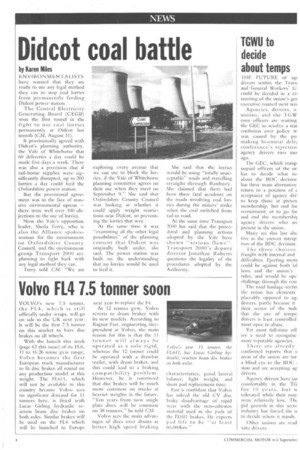Didcot coal battle
Page 6

If you've noticed an error in this article please click here to report it so we can fix it.
by Karen Miles ENVIRONMENTALISTS have warned that they are, ready to use any legal method, they can to stop coal lorries from permanently feeding Didcot power station.
The Central Electricity Generating Board (CEGB) won the first round in the fight to use coal lorries permanently at Didcot last month (CM, August 31).
It provisionally agreed with Didcot's planning authority, the Vale of Whitehorse that 60 deliveries a day could be made five days a week. There was also a provision that if rail-borne supplies were significantly disrupted, up to 200 lorries a day could feed the Oxfordshire power station.
But the provisional agreement was in the face of massive environmental uproar — there were well over 100 ob: jections to the use of lorries.
Now the Vale's opposition leader, Sheila Terry, who is also the Alliance spokeswoman for the environment on Oxfordshire County Council, and the environment group Transport 2000 a re planning to fight back with any legal method they can.
Terry told CM: "We are
exploring every avenue that we can use to block the lorries, if the Vale of Whitehorse planning committee agrees on their use when they meet on September 9." She said that Oxfordshire County Council was looking at whether it could apply weight restrictions near Didcot, so preventing the lorries that way.
At the same time it was "examining all the other legal possibilities" of the planning consent that Didcot was originally built under, she said. The power station was built on the understanding that no lorries would be used to feed it. She said that the lorries would be using "totally unacceptable" roads and travelling straight through Banbury. She claimed that there had been three fatal accidents on the roads involving coal lorries during the miners' strike when the coal switched front rail to road.
At the same time Transport 2000 has said that the procedural and planning actions adopted by the Vale have shown "serious flaws". Transport 2000's deputy director Jonathan Roberts questions the legality of the procedures adopted by the Authority.




































































































